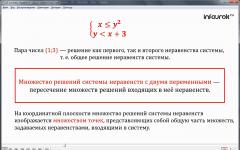Hello again!!!
Dear friends, with these words I greet you and at the same time remind you of my article about “ magic words“, it’s called “Hello again,” remember? No?! Then take a look
That time I wrote about magic magic words
, about what words are called magic, and why you shouldn’t forget about them. We discussed the words of greeting in more detail.
What is the difference between words of greeting and words of farewell?
Of course words of greeting and farewell differ in the situation in which these words are pronounced. But that's not what I'm talking about now.
In the Russian language there is a clear division: greetings act as statements, words goodbyes express wishes.
When meeting and addressing an interlocutor, it is customary to talk about an established fact: “Good morning! Good evening! Greetings!" And even the word “HELLO” states the fact: I am alive and well, i.e. Hello, I’m glad to see you in health.
When parting, on the contrary, the speaker does not state a fact, but expresses a WISH.
This division is explained by the Russian case system: in words of greeting the nominative or accusative case is used, in words of farewell the genitive case is used.
Phrases and words of farewell
When saying goodbye they say different phrases. As with greetings, much depends on what time of day the farewell phrase is said, who says it, and also on the communication situation.
In any situation the phrase is possible "Goodbye".
It can be said by anyone at any time. This phrase expresses a wish see you soon, the interlocutors part until a new date (genitive case, so the word ends on -I).
If, upon parting, the interlocutors have already agreed on new meeting, then instead of “Goodbye!” you can say “See you!”, “See you tomorrow,” “See you the weekend!” etc.
Also when saying goodbye The phrases “All the best!”, “All the best!”, “Good luck!” are widely used.
Friends can say goodbye casually: “Happy!”, wishing happiness to each other.
When we see someone off, when we part, we wish them “Bon voyage!” or “Have a nice trip!”
When going to bed, people wish each other “Good night!” or “Good night!”, “Pleasant dreams.”
As we see, in all phrases when parting we express a WISH! Words of farewell are always used V genitive case.
However, lately you can hear phrases like this on TV when the presenter greets the audience: “ Good afternoon! or on the night air: “Good night.”
Or else on the Internet, reading blogs, for example, I often come across the following greeting phrase: “Good day!”
Do you feel, dear friends, that there is something wrong in all this?! Of course, in these phrases there is a violation of the norms that I wrote about above. If these are greetings, then it is correct to construct these phrases using nominative: good afternoon, good night, good time of day. Words in the form genitive case a wish is expressed, which is appropriate at the end of the conversation, when saying goodbye, and not at the beginning.
...Everything I am writing about now has been known for a long time. Perhaps this will be of interest only to a foreigner studying the Russian language, or to someone who has never learned that the phrase “GOOD BYE” consists of TWO words, and the word SVEDANIE is in the genitive case, which means it has the ending “I”: GOODBYE.(Wow, how “goodbye” offends me!)
The meaning of the words of farewell is transparent and understandable.
But what is not clear is why, when saying goodbye, we say: “BYE” and even more trenchantly, “COME ON.”
What is this “for now”? And what about “come on”, why come on!?
In the Russian language dictionary by S.I. Ozhegov, the word BYE has 4 meanings:
1. While - this is an adverb, meaning “for some time”, “forward to something”; He's still studying. Nothing is known yet.
2. While - this is a union, its meaning is during that time. While he is studying, we need to help him.
3. While - this is a conjunction, meaning - as long as. Fight until we win.
4. For now – this is a PARTICLE. Goodbye (colloquial). Well, bye!
As is known, particle is a service particle part of speech, which serves to express shades of meaning of words, phrases, sentences and to form word forms.
In other words, this word BYE, - official, it does not have semantic meaning, but only serves to convey some meaning!
How and why the word BYE appeared in our language to express farewell, what wish is expressed?!
Perhaps this is a shortened form of wishing for something?..
By the way, Korney Chukovsky in the book “Alive as Life. Stories about the Russian language" talked about this word like this:
“...this form is filled with the most kind courtesy, because the following (approximately) meaning is compressed here: be prosperous and happy, we will not see each other again.”
Anyway, goodbye "Bye" has already firmly entered our vocabulary, and everyone uses this word, regardless of upbringing and education.
Along with this word, you can often hear the colloquial: “Well, be!” or “Be there!”, “Everything!”
Here, as mentioned above, the speaker wishes to the interlocutor “to be”: either to be healthy, or to be happy, or simply wishes all the best...
But that’s why very often we hear, and sometimes we ourselves say: “Come on”!?
Let us turn again to the authoritative dictionary of S.I. Ozhegov.
Let's– imperative mood from the indefinite form of the imperfective verb “to give”. Indicates:
1) an invitation to do something together (colloquial). Let's run. Let's have lunch.
2) the meaning of began, became (colloquial). He let's run . (I think that in this meaning, the word “come on” is close to a particle)
3) alone or when used with imperative mood another verb denotes compulsion to action (colloquial). Start off? - Let's! Come on, go away .
Now if you follow the logic use of words when saying goodbye, let’s ask ourselves: what does a person wish for his interlocutor when he says “Come on”!? Want to invite him to do something together? Maybe let's say goodbye? Shall we shake hands goodbye? Or he wishes like this: “Let everything be fine with you.” Or maybe the farewell “Come on” was formed by analogy with the word: “Byvay” and means the same thing?
I would like to hear your opinion, reader!
Tired of boring greetings? Do you want to surprise your loved one or make someone fall in love with you? Then this article is for you, because here is a collection of the best and original greetings.
10 most original greetings in the world
Many countries have their own original greeting phrases.
In Japan, people are not used to saying any phrases indicating a specific greeting, since the inhabitants of the country are very busy people. To greet a person here, simply nod your head after him. If we are talking about expressing deep respect, then the Japanese kneel and bow to him. Depending on the bow, the level of respect of a person is determined. Of course, you shouldn’t bow to the ground, this is already a mockery.
In Thailand, it is customary to raise both hands up, as this means “peace” and “respect.” A more honorable greeting is to raise, cross your arms above you, and bow. For this reason, you should not be surprised if you hear the phrase “Hands up!” This is just such an original greeting.
In one tribe in Kenya, people spit when greeting each other. Spitting is a venerable tradition here. Before greeting, fellow tribesmen spit on their hands.
In some Greenlandic families, it is customary to rub noses when meeting a loved one.
In India, people squat when meeting. Therefore, you should not be surprised if Indians are squatting in the middle of the street - they are just saying hello.
Many people in Tibet stick out their tongues when meeting people, as this is considered a sign of peacefulness. The fact is that a king with a black tongue used to live here. He was very angry and punished unfaithful residents and subjects with death. After his death, people were afraid that his soul would pass to another person, so when they met, people began to stick out their tongues at each other.
In some cities on the Polynesian islands, instead of shouting various phrases, it is customary to greet cheek to cheek, taking a deep breath.
A very original greeting in the Philippine Islands: when talking to an elder, you need to press his hand to your cheek.
In New Zealand, all nations have a custom of rubbing noses together. Therefore, it is not surprising if you see men rubbing their noses on the streets of the city.
Africa has perhaps one of the most beautiful greetings. In order to perform it, you need to take your right hand and bring it first to your forehead, then to your lips and later to your heart. Literally this means: I think, I speak and I respect.
How they say hello in Russia
In Russia you can see different ways say hello. In addition, our language is rich in greetings. They usually greet each other verbally and non-verbally.
Verbal methods are quite simple. This can be: “Good afternoon”, “Good morning” and “Good evening” - when addressing respected people, “Hello” and “Hello” - when addressing relatives and friends.
Hit a girl the first time

How to stand out and come up with an original greeting to a girl? Something unusual instead of the usual “hello”? Everything is quite simple.
You just need to replace the word “hello” or “hello” with any greeting in another language. For example, if a girl likes English or French, you can answer “bonjour” or “hello”. And then these can be words spoken in Italian, German, Chinese, etc. Say this phrase, and the girl’s number is guaranteed (or her smile).
Be smart and surprise her: “Today is a great day, and so is your sunny smile. Hello". Or this: “You are beautiful, like the sun in the morning. Good afternoon". Or: “You are simply charming today, mademoiselle. Good day!” Another option: “You are a ray of sunshine that breaks through the gray clouds. I am glad to welcome you." Well, there are other options of this kind.
Give the girl a smile and show respect with a curtsey. You don't have to say anything. The girl will already be pleased that you are trying to be a gentleman for her. Kiss her hand and the beauty's heart will thaw.
If the girl acts as a friend, then you can simply hug her and kiss her on the cheek. A light greeting in this way will immediately endear you to the person.

An original greeting to a guy can strengthen the relationship. If we are talking about a loved one, then the girl can write him a poem. If you don’t have the talent for writing poetry, you can look for ready-made poems on the topic “Good morning/afternoon/evening.”
If you need to greet a guy in person, you can simply kiss or hug. Best option than “Good day!” cannot be found. You can say hello to a guy at English, while wishing you a good school/work day. A little politeness wouldn't hurt.
A man needs support

Greetings to a man? Original phrases will cheer up any person throughout the day, encourage and encourage a gentleman to do great things. To a friend or even to a loved one You can give a compliment, and only then say hello. For example: “You look cheerful today. Stay like this all day. Good morning”, “You look good. A smile especially suits you. Glad to see you." Also, sometimes a nod of the head and a simple smile are enough. Believe me, it is better to smile at a person, and that will be enough for him.
List of phrases for meeting a girl
An original greeting is a sure way to find a life partner and be known as a person with a subtle sense of humor:
- It seems like amnesia is setting in. Perhaps he has already approached you?
- Is there a thread? I want to make friends here and now.
- You are so beautiful that I forgot my line.
- Let me walk you home, at least with a glance.
- You can light up this street with a smile, it’s painfully dark here.
- You are so beautiful that you feel sorry for everyone around you. They are nothing compared to you.
- I think I forgot my phone number. Could you give me yours?
- I am starting to rewrite the people living in Russia. Let me start with you?
- If I smile at you, it doesn't mean that I want to meet you. You are wrong, because I want to ask you on a date.
- You're on my to-do list for the evening.
- I may not be the best here, but I'm the only one who talks to you.
- Do you remember me? You and I met in your dreams. True, then I was wearing a helmet and on a white horse.
- What will you do tonight after we go to the cinema?

So, be unconventional in all situations. An original greeting is the best start to the day and end of the evening.
(1) In my opinion, dear to our ears" Good morning, “good evening” and “good afternoon” differ from the more neutral “hello” in that, wanting to be more pleasant and less formal, the interlocutor took the trouble to mention a specific time of day in his greeting. If, not knowing what time of day it is, he talks or writes about “good time of day” in general, then this already looks like a parody. Imagine that, without knowing the name of the interlocutor, you, for the sake of pleasantness, greet him like this: “Hello, owner of the name.”
(2) On the other hand, the greetings "good morning", "good evening" and "good afternoon" are expressed in nominative case and, if you think about it, these are exclamations and a call for empathy, joint joy that it was a good morning (afternoon, evening). Again, all this becomes meaningless if you and the interlocutor are separated by many time zones or writing and reading text do not occur at the same time.
(3) And finally, “good day” is written in the genitive case, which in Russian means a wish, traditionally used as a farewell, and not as a greeting. But even if you replace it with “good time of day,” paragraphs 1 and 2 remain in force.
But the opinion of the famous linguist D.F. Sc., prof. M. A. Krongauz, given on the website Gramota.ru:
The use of greetings is regulated not so much by rules (it is appropriate to talk about rules when it comes to spelling), but by norms speech etiquette. This is what he writes about the greeting Good Night! famous Russian linguist D.F. Sc., prof. M. A. Krongauz in the book “The Russian Language on the Verge of a Nervous Breakdown” (M., 2008): Among the new “freaks” of speech etiquette there are also native Russians. One of my least favorite is the new and already well-established greeting “Good night!” It appeared along with a new phenomenon - live night broadcasting. First, in the speech of the presenters, who in this way - with special chic - greeted the viewers / listeners who called the studio at night. Then “Good night!” was picked up by the callers themselves and even went beyond the studio conversations. For example, it is sometimes used as a greeting when making a telephone call too late. In fact, the appearance of such a greeting contradicts many norms of language. Firstly, in European languages a similar formula (good night, Gute Nacht and bonne nuit) is used specifically when saying goodbye, in contrast to daytime greetings such as the English good morning, good evening, the German Guten Morgen, Guten Tag, Guten Abend or the French bonjour, bonsoir. This also corresponds to the usual Russian farewell “Good night!” Secondly, in Russian “Good night!” as a farewell formula already exists, although it is used much less frequently than “Good night!” Thirdly, it introduces the genitive case, which in Russian means a wish, traditionally used precisely as a farewell: “Have a nice journey!”, “Good luck!”, “Happiness to you!” etc. (with the verb “I wish” omitted). The greeting is expressed in a different case (“Good afternoon!”, “Bread and salt”!). Recently, by analogy with this, new “wrong” greetings have appeared. For example, on the Internet it is increasingly common "Good day!" emphasizing the fact that the email can be received at any time. As a linguist, I would strongly recommend not to shake the harmonious system of Russian etiquette and not to use greetings in the genitive case. On the same Internet, you can also find a more competent greeting, “Good day!” The game is saved and the rules are followed. But with all this, I risk finding myself in the position of authors who struggled with the goodbye “Bye!” After all, it is not the linguist who puts the final point, but the people. And if the word takes possession of the masses, and the masses - the word, then no linguist will be able to ban it. So we'll wait and see.
I already asked my question, but there is no answer.
The question concerns the greeting “Good night!”, which is often used to greet each other on television at night. It seems to me that it is more appropriate to use “Good evening!” even if it is night time. Because Good night is immediately associated with the wish of Good night. What do the rules say? Please answer.
Russian help desk response
The use of greetings is not so much regulated rules(it is appropriate to talk about rules when it comes to spelling), as well as norms of speech etiquette. This is what he writes about greetings Good night! famous Russian linguist D.F. Sc., prof. M. A. Krongauz in the book “The Russian language is on the verge of a nervous breakdown” (M., 2008):
Among the new “freaks” of speech etiquette there are also native Russians. One of my least favorite is the new and already well-established greeting “Good night!” It appeared along with a new phenomenon - live night broadcasting. First, in the speech of the presenters, who in this way - with special chic - greeted the viewers / listeners who called the studio at night. Then “Good night!” was picked up by the callers themselves and even went beyond the studio conversations. For example, it is sometimes used as a greeting when making a telephone call too late.
In fact, the appearance of such a greeting contradicts many norms of language. Firstly, in European languages a similar formula (good night, Gute Nacht and bonne nuit) is used when saying goodbye, in contrast to daytime greetings such as English good morning, good evening, German Guten Morgen, Guten Tag, Guten Abend or French bonjour, bonsoir. This also corresponds to the usual Russian farewell “Good night!”
Secondly, in Russian “Good night!” as a farewell formula already exists, although it is used much less frequently than “Good night!”
Thirdly, it introduces the genitive case, which in Russian means a wish, traditionally used precisely as a farewell: “Have a nice journey!”, “Good luck!”, “Happiness to you!” etc. (with the verb “I wish” omitted). The greeting is expressed in a different case (“Good afternoon!”, “Bread and salt”!).
Recently, by analogy with this, new “wrong” greetings have appeared. For example, “Good day!” is increasingly common on the Internet, emphasizing the fact that an email can be received at any time.
As a linguist, I would strongly recommend not to shake the harmonious system of Russian etiquette and not to use greetings in the genitive case. On the same Internet, you can also find a more competent greeting, “Good day!” The game is saved and the rules are followed. But with all this, I risk finding myself in the position of the authors who struggled with the goodbye “Bye! " After all, it is not the linguist who puts the final point, but the people. And if the word takes possession of the masses, and the masses - the word, then no linguist will be able to ban it. So we'll wait and see.
The administration of the city of Yekaterinburg, within the framework of the project “Ekaterinburg speaks correctly,” addresses the issue of the correctness of using the combination “good night.”
Specialists of the reference and information portal “Russian Language” note that the use of greetings is regulated by the norms of speech etiquette. This is what he writes about the combination “Good night!” famous Russian linguist Doctor of Philology, Professor M. A. Krongauz in the book “The Russian Language on the Verge of a Nervous Breakdown”:
“Greeting “Good night!” It appeared along with a new phenomenon - live night broadcasting. First, in the speech of the presenters, who in this way - with special chic - greeted the viewers / listeners who called the studio at night. Then “Good night!” was picked up by the callers themselves and even went beyond the studio conversations. For example, it is sometimes used as a greeting when making a telephone call too late.
In fact, the appearance of such a greeting contradicts many norms of language. Firstly, in European languages a similar formula (good night, Gute Nacht and bonne nuit) is used when saying goodbye, in contrast to daytime greetings such as English good morning, good evening, German Guten Morgen, Guten Tag, Guten Abend or French bonjour, bonsoir. This also corresponds to the usual Russian farewell “Good night!”
Secondly, in Russian “Good night!” as a farewell formula already exists, although it is used much less frequently than “Good night!”
Thirdly, it introduces the genitive case, which in Russian means a wish, traditionally used precisely as a farewell: “Have a nice journey!”, “Good luck!”, “Happiness to you!” and so on (with the verb “I wish” omitted). The greeting is expressed in a different case (“Good afternoon!”, “Bread and salt”!).
Recently, by analogy with this, new “wrong” greetings have appeared. For example, “Good day!” is increasingly common on the Internet, emphasizing the fact that an email can be received at any time.
As a linguist, I would strongly recommend not to shake the harmonious system of Russian etiquette and not to use greetings in the genitive case. On the same Internet, you can also find a more competent greeting, “Good day!” The game is saved and the rules are followed. But with all this, I risk finding myself in the position of authors who struggled with the goodbye “Bye!” After all, it is not the linguist who puts the final point, but the people,” Krongauz concluded.
Thus, the correct thing to do is: good day.
Photo www.yandex.ru
Related materials
| Which is correct: animal encyclopedia or animal encyclopedia? July 20, 2017 09:46 | |
| Which is correct: wait for a letter or letters? 19 July 2017 09:20 | |
| Which is correct: the sun burns or burns? July 18, 2017 10:12 | |
| Which is correct: with this or in addition? 17 July 2017 09:35 | |
| Which is correct: a representative of Yekaterinburg or from Yekaterinburg? 13 July 2017 09:35 | |
| Which is correct: earthen or earth excavations? July 12, 2017 09:57 | |
| Which is correct: nothing else or nothing else? 11 July 2017 09:29 | |
| Which is correct: to celebrate Ivan Kupala or Ivan Kupala? 7 July 2017 10:29 | |








